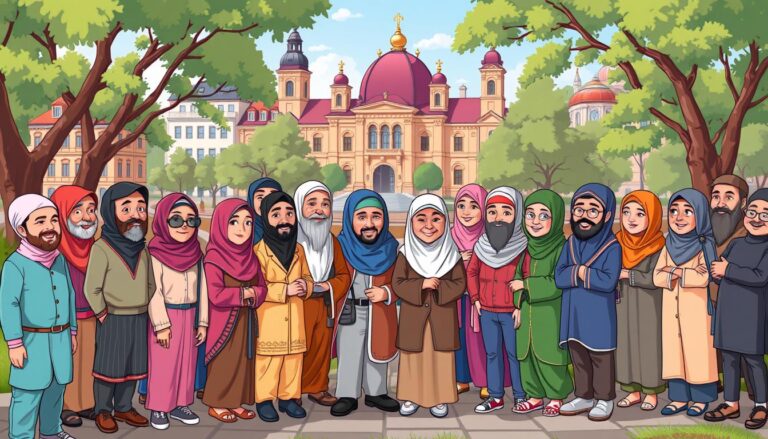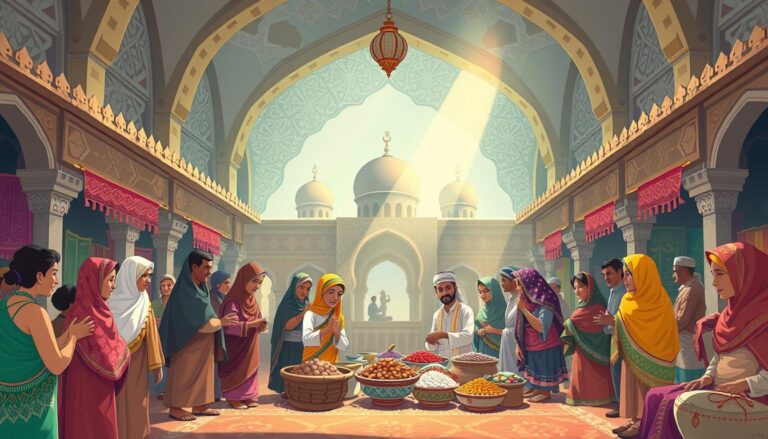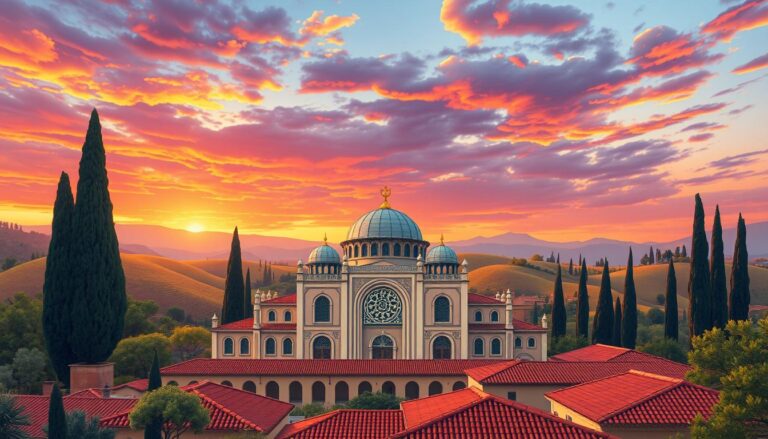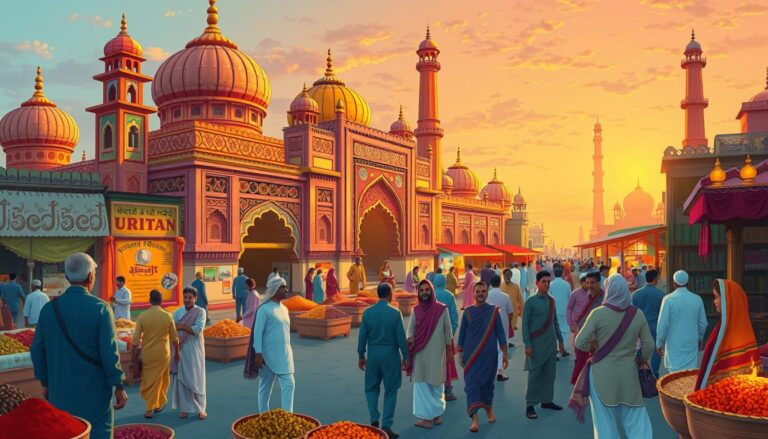Islam in Ireland
At the time of the 2016 census, there were over 60,000 Muslims living in Ireland, making Islam the third-largest religion in the country. This remarkable statistic underscores the growing presence and significance of the Muslim community within the Emerald Isle. From the humble beginnings of the first Islamic societies and mosques established in the 1950s, the Muslim population in Ireland has undergone a remarkable transformation, with projections indicating that it will overtake the nation’s Protestant population within the next two decades.
Ireland’s Muslim community is not only growing in size but also diversifying in its ethnic and national backgrounds. Around 21% of Irish Muslims in the younger generation are of Palestinian descent, 18% have mixed Irish-Moroccan heritage, and approximately 10% have roots in Libya. This mosaic of cultures and experiences has enriched the social fabric of Ireland, as the Muslim community continues to contribute to the country’s vibrant and pluralistic society.
Key Takeaways
- Islam is the third-largest religion in Ireland, with over 60,000 Muslims as of the 2016 census.
- The Muslim population in Ireland is expected to grow substantially in the coming years, potentially surpassing the Protestant population within the next two decades.
- Ireland’s Muslim community is diverse, with significant representation from Palestinian, Moroccan, and Libyan backgrounds, among others.
- The Muslim community in Ireland has faced challenges, such as incidents of Islamophobia and racism, but has also experienced increased tolerance and community support over time.
- Islamic organizations and educational institutions play a vital role in the integration and empowerment of the Muslim population in Ireland.
History of Islam in Ireland
The presence of Islam in Ireland can be traced back to the 1950s, when the earliest mentions of Ireland in Muslim sources emerged. Al-Idrisi, a renowned Arab geographer, referred to Ireland as “Irlandah-al-Kabirah” (Great Ireland) in his influential work, the Tabula Rogeriana.
The first Islamic society in Ireland was established in 1959 by Muslim students studying in the country, known as the Dublin Islamic Society, which later became the Islamic Foundation of Ireland. This was a significant milestone in the history of Islam in Ireland, as it marked the beginning of organized religious activities and community-building efforts.
Establishment of First Islamic Societies and Mosques
The opening of the first mosque and Islamic center in Ireland occurred in 1976, when a four-story building at 7 Harrington Street in Dublin 8 was converted for this purpose. As the Muslim population grew, the need for a larger facility became evident, leading to the relocation of the Dublin Mosque and Islamic Centre to 163 South Circular Road, Dublin 8, in 1983.
Over the years, other Islamic societies and mosques were established across Ireland, such as the Ballyhaunis Mosque in the Northwest in 1986, the Islamic Cultural Centre in Dublin in 1996, and the Islamic Foundation of Ireland’s branch in Waterford in 1999. These developments demonstrate the gradual growth and expansion of the Muslim community in Ireland.
“The first Islamic Society in Ireland was established in 1959, known as the Dublin Islamic Society, now the Islamic Foundation of Ireland.”
Muslim Population and Demographic Trends
The Muslim population in Ireland has experienced remarkable growth over the past few decades. According to the 2022 census, there were 81,930 Muslims living in the Republic of Ireland, representing a 29.1% increase from the 2016 census figures. This growth trend is evident, with the Muslim population rising from just 3,873 in 1991 to 81,930 in 2022.
Growth of Muslim Community Over the Decades
The Muslim community in Ireland has seen a significant increase in its numbers, with a 95% rise since 2006. In 2016, the average age of Muslims in Ireland was 26.0, and the gender distribution showed 129 males per 100 females, narrowing from 147 males per 100 females in 2006.
Geographic Distribution of Muslims Across Ireland
The geographic distribution of Muslims across Ireland reveals higher concentrations in certain regions. The cities and towns with the largest Muslim populations are Dublin and its suburbs (37,458), Cork and suburbs (4,535), Limerick and suburbs (3,394), Galway and suburbs (2,367), and Waterford and suburbs (2,084).
The diverse religious landscape in Ireland is further enriched by the presence of other minority groups, such as Hindus, who have seen a 135.6% increase from 2006 to 2016, and Buddhists, whose population grew by 12.1% between 2011 and 2016.
Diversity Within the Muslim Community
The Muslim community in Ireland is remarkably diverse, with members hailing from a wide range of ethnic and national backgrounds. Over 55% of Ireland’s Muslims are of Asian or African descent, while 30.7% hold Irish nationality. This tapestry of identities creates a vibrant and multifaceted Muslim community that enriches the cultural fabric of the country.
Muslims in Ireland come from a variety of countries, including Pakistan, Algeria, Libya, Lebanon, Iran, Iraq, Egypt, Nigeria, Somalia, Bangladesh, India, Malaysia, Bosnia, Kosovo, Jordan, Kuwait, Saudi Arabia, and Turkey. This diversity is a testament to the global reach of the Muslim faith and the ability of the Irish society to welcome and integrate people from all corners of the world.
- The ethnic and national diversity within the Muslim community in Ireland reflects the global nature of the religion.
- Ireland’s Muslim population includes individuals from countries across Asia, Africa, the Middle East, and Europe.
- The integration of these diverse backgrounds contributes to the richness and vibrancy of the Muslim community in Ireland.
“Being a Muslim in Ireland has been a unique and transformative experience for me. The diversity of the community has allowed me to learn from and connect with people from all walks of life.”- Saima Khan, a Muslim resident of Ireland
The diversity within the Muslim community in Ireland is a testament to the country’s openness and acceptance, as well as the resilience and adaptability of the Muslim faith. This multifaceted community continues to play a vital role in shaping the cultural landscape of Ireland.
Islam in Ireland
Islam has been present in Ireland since the 1950s, with the Muslim community steadily growing over the decades. Today, Islam is the third-largest religion in the country, and the Muslim population is expected to increase substantially in the coming years.
According to the 2022 census, there were 83,300 Muslims living in the Republic of Ireland, representing a 29.1% increase over the figures for the 2016 census. The majority of the Muslim community in Ireland is concentrated in major cities like Dublin, Cork, Limerick, Galway, and Waterford.
The Muslim population in Ireland is diverse, with followers of both Sunni and Shia Islam, and members from a wide range of ethnic and national backgrounds. Around 55% of Muslims in Ireland are either Asian or African nationals, while 30.7% have Irish nationality.
The Islamic Foundation of Ireland has been acting as the certifying body for Halal meat exported from Ireland to Muslim countries since 1981, reflecting the growing importance of the Muslim community in the country.
Despite the growth of the Muslim community, second-generation Muslims in Ireland often face challenges adapting culturally in a society where their religion may not be visibly understood or embraced. However, initiatives like the Muslim Sisters of Éire, a charity group led by Lorraine O’Connor, are working to educate the non-Muslim community about Islam and normalize the religion through community engagement.
Sunni and Shia Traditions in Ireland
Ireland’s Muslim community is characterized by the presence of both Sunni and Shia traditions. While the two groups share the core beliefs of Islam, they have distinct spiritual leaders and places of worship. The diverse nature of the Irish Muslim population is reflected in the coexistence of these two major Islamic denominations.
Irish Council of Imams
The Irish Council of Imams, formed in 2006, serves as an informal body that brings together the spiritual leaders of both Sunni and Shia Muslims in Ireland. This council collaborates with Christian and Jewish theologians, engaging in joint activities with other faiths across Dublin and beyond. The council’s role is to promote unity, understanding, and cooperation within the diverse Irish Muslim community.
The Sunni Muslims in Ireland are predominantly represented by the Islamic Cultural Centre of Ireland in Clonskeagh, Dublin, where Sheikh Hussein Halawa serves as the Imam. On the other hand, the Shia community has its own hub at the Ahlul Bayt Islamic Centre in Milltown, Dublin, under the leadership of Sheikh Dr. Zille-Umar Qadri.
“The Irish Council of Imams acts as an informal body for Muslim scholars in Ireland, collaborating with Christian and Jewish theologians and engaging in joint activities with other faiths in Dublin and beyond.”
The presence of both Sunni and Shia traditions within the Irish Muslim community reflects the global diversity of Islam, with Sunnis constituting the majority and Shias representing a smaller, but nonetheless significant, portion of the worldwide Muslim population.
Despite their theological differences, the Sunni and Shia Muslims in Ireland have coexisted peacefully, contributing to the country’s rich religious diversity and fostering interfaith dialogue and understanding.
Integration and Representation
The integration of Muslims into Irish society has been a gradual yet significant process. One notable milestone was the election of Moosajee Bhamjee in 1992 as the first, and so far only, Muslim Teachta Dála (Member of Irish Parliament), demonstrating the growing representation of Muslims in Irish politics.
According to Dr. Umar Al-Qadri, the Muslim community in Ireland has experienced substantial growth, increasing from 33,000 members in 2003 to over 70,000 today. This diverse community includes individuals from various professions, ranging from taxi drivers to IT professionals.
However, the integration of Muslims in Ireland has not been without its challenges. Al-Qadri highlights issues related to marginalization, persecution, and criticism faced by the Muslim community. In response to media bias and misrepresentation, he emphasizes the importance of fostering integration and mutual respect within Irish society.
To address these concerns, Al-Qadri founded the Irish Muslim Peace and Integration Council in 2015, following the Charlie Hebdo attacks in Paris. The council aims to promote peace and integration within the Muslim community, and to distance local Muslims from extremist groups that do not represent the majority.
“The relationship between Islam and Europe is mainly based on conflict and distrust. Modern European society’s foundations are based on opposition to Islam and the exclusion of the Islamic ‘other’.”
The growing presence and integration of Muslims in Irish politics and society is a significant step towards greater representation and understanding. As the Muslim community continues to evolve, the challenge lies in addressing misconceptions, promoting dialogue, and fostering a more inclusive and harmonious future for all in Ireland.
Mosques and Islamic Centers Across Ireland
As the number of Muslims in Ireland has grown rapidly over the last few years, more mosques and prayer halls have been established to cater to their needs. The largest mosque is the Islamic Cultural Centre of Ireland (ICCI) in Dublin, which can accommodate up to 1,700 people and has an interior area of 5,000 square meters.
The ICCI, which was officially opened in 1996, features a 20-meter tall minaret and is situated on a 3.5-acre site. The construction of the center cost IR£5 million and was designed by the Irish architectural firm Michael Collins & Associates, which won an award in 1997 for their design.
In addition to the ICCI, other mosques and prayer halls can be found in various cities and towns across Ireland. The Belfast Islamic Centre, established in 1978, serves Muslims from all backgrounds and reports that around 12,000 Muslims live in Northern Ireland. The center operates various services, such as the Islamic Funeral Service, Shahada ceremonies, and hosting educational seminars.
The growth of mosques and Islamic centers in Ireland has been a reflection of the increasing diversity and presence of the Muslim community in the country. These institutions not only serve as places of worship but also play a vital role in fostering community engagement and preserving cultural traditions.
Challenges and Opportunities
The growing Muslim community in Ireland faces both challenges and opportunities as they integrate into the wider society. One key challenge is addressing misconceptions and countering Islamophobia, which can create barriers to full social and political participation.
Despite these obstacles, there are significant opportunities for increased representation and cultural exchange. Recent data shows that while there are currently no Muslim members of the European Parliament from Ireland due to Brexit, Muslim individuals have made strides in other areas of public life, such as serving as diversity officers in the national police force.
Anecdotal evidence suggests that many Muslims, including children, have positive experiences living in Ireland and contributing to the country’s diversity. Conferences like “Islam and Ireland” have provided platforms to discuss the role of Islam in Irish society and tackle issues of anti-Muslim racism, highlighting the diverse experiences within the community based on factors like gender.
“The aim of the conference was to examine the role of Islam as the fastest-growing religious community in Ireland and its interaction with society.”
As the Muslim population continues to grow, particularly in urban areas, there are opportunities for increased interfaith collaboration and the development of a more inclusive, pluralistic Ireland that celebrates its religious and cultural diversity.
Islamic Education and Youth Engagement
The Muslim community in Ireland is actively engaged in providing Islamic education and youth programs to foster a sense of identity and belonging among the younger generation. These efforts aim to promote understanding and integration within the broader Irish society.
Islamic education plays a crucial role in shaping the values and beliefs of young Muslims in Ireland. Through various programs and initiatives, the community is ensuring that the younger generation remains connected to their faith and cultural heritage. This not only strengthens their personal and spiritual development but also contributes to their successful integration into Irish society.
One of the key focus areas of Islamic education in Ireland is youth engagement. The community organizes a wide range of activities, from Quranic study circles to leadership development workshops, to engage young Muslims and help them navigate the challenges of growing up in a multicultural environment.
“The goal is to empower our youth, to help them build a strong sense of identity and to equip them with the tools they need to thrive in both their faith and their community,” says Imam Khalid Hussain, a prominent figure in the Irish Muslim community.
These efforts have yielded positive results, with a growing number of young Muslims actively participating in community events and taking on leadership roles. The integration of Islamic education and youth engagement has not only fostered a stronger sense of belonging but has also contributed to the overall social cohesion and cultural diversity in Ireland.
As the Muslim population in Ireland continues to grow, the need for effective Islamic education and youth engagement programs has become increasingly crucial. The community remains committed to investing in the future of its young people, ensuring they are equipped with the knowledge, skills, and support to navigate their dual identities and contribute positively to Irish society.
Cultural Contributions of Muslims in Ireland
The Muslim community in Ireland has made significant cultural contributions, enriching the country’s diverse landscape. From their flavorful cuisines to their captivating art and music, the influence of Islamic heritage can be felt across Ireland.
One of the most notable cultural contributions of Muslims in Ireland is their cuisine. Irish-Muslim restaurants and cafes showcase a delightful array of Middle Eastern and North African dishes, introducing locals and visitors alike to the vibrant flavors of the Muslim world. These establishments have become hubs of cultural exchange, where people come together to savor the aromas and tastes of this rich culinary tradition.
Additionally, the Muslim community has left an indelible mark on Ireland’s artistic landscape. Islamic-inspired art and calligraphy can be found in various galleries and public spaces, captivating audiences with their intricate patterns and mesmerizing designs. Musicians of Muslim heritage have also made significant contributions to Ireland’s music scene, blending traditional Islamic melodies with local Irish influences to create a truly unique soundscape.
“The cultural contributions of Muslims in Ireland have been a testament to the richness and diversity of our nation. Their culinary, artistic, and musical offerings have enriched the lives of Irish citizens and fostered a greater understanding of Islamic culture.”
As the Muslim population in Ireland continues to grow, their cultural impact is expected to expand further, strengthening the country’s reputation as a hub of multicultural exchange and celebration.
Future Growth and Development
The Muslim community in Ireland is poised for continued growth and integration within the country’s vibrant society. As the population expands, exciting opportunities await for enhanced cultural exchange, increased political representation, and the mitigation of misconceptions and Islamophobia.
According to recent statistics, Islam is one of the fastest-growing religions in Ireland, currently ranking as the third-largest faith community. Fueled by natural population growth and continued immigration, the Muslim population in Ireland is projected to substantially increase in the coming years, potentially surpassing the nation’s Protestant population within the next two decades.
Researchers at the University College Cork’s Study of Religions Department, funded by the Irish Research Council and the Department of An Taoiseach, are spearheading a comprehensive three-year study to explore the evolving landscape of Islam in Ireland. This collaborative effort, led by Dr. Oliver Scharbrodt and his team, aims to shed light on the diverse ethnic and national backgrounds that enrich the Muslim community.
As the younger generation of Irish Muslims come of age, there is a pressing need to address challenges related to cultural adaptation and identity crisis. Around 50% of the UK’s Muslim population is younger than 25, and a similar trend is expected in Ireland, according to projections from an Oireachtas political adviser. Empowering these youth and providing them with the necessary support will be crucial for their successful integration and the community’s long-term growth.
Furthermore, the Muslim community in Ireland has been actively engaged in charitable work, with organizations like the Muslim Sisters of Éire playing a vital role in supporting the homeless population in Dublin. These initiatives help to build bridges between Irish Muslims and the wider community, integrating the faith more visibly and normalizing its presence within the national landscape.
As the future unfolds, the Muslim community in Ireland is poised to make significant strides, contributing to the nation’s rich tapestry of diversity and showcasing the valuable role they play in shaping Ireland’s cultural and social fabric.
Conclusion
As we’ve explored, Islam has a growing and vibrant presence in Ireland, with a diverse Muslim community that has become an integral part of Irish society over the past several decades. While the community has faced challenges, such as addressing misconceptions and Islamophobia, it has also made significant cultural contributions and found ways to integrate and thrive.
The research showcases the successful integration of Muslim communities, particularly those of Pakistani descent, who have embraced both their Islamic faith and Irish identity. The synthesis of spiritual beliefs, such as Sufism, with Irish mysticism, as well as the celebration of religious events like the Prophet Muhammad’s birthday, demonstrate the ongoing efforts to foster understanding and unity.
Looking ahead, the future of Islam in Ireland appears promising, with continued growth and development of the Muslim community. As the community navigates the challenges and seizes the opportunities before it, the incorporation of Islam into the fabric of Irish society will undoubtedly continue to evolve, contributing to the rich cultural diversity that defines Ireland.
Source Links
- ‘I changed my faith, I didn’t change my identity’: Irish Muslims push to find a new place in society
- What is it like to grow up Muslim in Ireland?
- Islam in the Republic of Ireland
- HISTORY OF MUSLIMS IN IRELAND
- Islam In Ireland – Declan Henry Author
- Religion – Non-Christian Census of Population 2016 – Profile 8 Irish Travellers, Ethnicity and Religion
- Region: Europe
- Young, Irish and Muslim
- Racialization of Muslim Students in Australia, Ireland, and the United States: Cross-cultural perspectives
- IFI
- Islam in Ireland – Ireland’s Eye Magazine
- Islam In Ireland: Shia Mosque And Shia Muslims (Part 4)
- Islam in Ireland
- A 1400 YEAR-OLD RELIGION AND ITS 21ST-CENTURY REPRESENTATIVE – Irish Muslim Council
- The Integration of Islam in the European Union: Prospects and Challenges
- Islamic Cultural Centre of Ireland
- About ICCI
- Belfast Islamic Centre – Islamic Center
- Muslim experience of living in Ireland heard at forum
- Ireland – United States Department of State
- Islamic Education in Europe –
- Something More Beautiful: Educational and Epistemic Integrations Beyond Inequities in Muslim-minority Contexts
- Equality, Inclusion, and Intercultural resources – National Youth Council of Ireland
- Muslims in Ireland: Past and Present
- From Irish Exceptionalism to European Normality?: The New I…
- 2009 Press Releases | University College Cork
- Debunking the myth that Irish Muslims do not integrate
- Comparing the evolution of IS and the IRA







